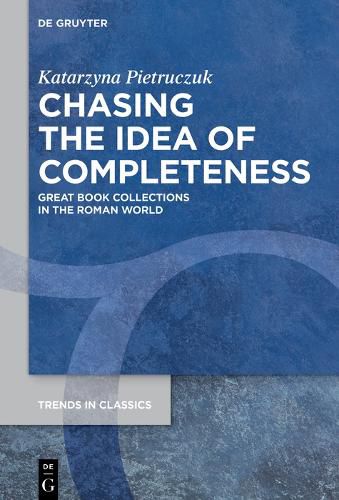Readings Newsletter
Become a Readings Member to make your shopping experience even easier.
Sign in or sign up for free!
You’re not far away from qualifying for FREE standard shipping within Australia
You’ve qualified for FREE standard shipping within Australia
The cart is loading…






This book sets out to explore how the Romans appropriated the Hellenistic concept of a complete library collection. Tracing this idea in the Roman world allows us to reconstruct the discourse on cultural transmission between Greece and Rome. The model of a super-library dominated the landscape of the Hellenistic period. The Romans were fascinated by this ideal, but never wholly embraced it and never formed one leading book collection of their own. This book attempts to answer the questions resulting from this observation: How did the Romans perceive the shifting of the world's cultural omphalos throughout their dominance in the Mediterranean? How did they map the empire of books? How did they acquire books for their private collections? This book contributes to the current debate on ancient scholarship by discussing the evolution of the concept of the library in Rome from a broad and novel perspective, thanks to approaching a gamut of sources which have not previously been brought into the scholarship on Roman libraries, such as Terence's programmatic prologues, testimonies on early Roman literary studies, or the Roman Didascaliae inscription. In addition, a fresh perspective is offered on Galen's newly discovered Peri alypias.
$9.00 standard shipping within Australia
FREE standard shipping within Australia for orders over $100.00
Express & International shipping calculated at checkout
This book sets out to explore how the Romans appropriated the Hellenistic concept of a complete library collection. Tracing this idea in the Roman world allows us to reconstruct the discourse on cultural transmission between Greece and Rome. The model of a super-library dominated the landscape of the Hellenistic period. The Romans were fascinated by this ideal, but never wholly embraced it and never formed one leading book collection of their own. This book attempts to answer the questions resulting from this observation: How did the Romans perceive the shifting of the world's cultural omphalos throughout their dominance in the Mediterranean? How did they map the empire of books? How did they acquire books for their private collections? This book contributes to the current debate on ancient scholarship by discussing the evolution of the concept of the library in Rome from a broad and novel perspective, thanks to approaching a gamut of sources which have not previously been brought into the scholarship on Roman libraries, such as Terence's programmatic prologues, testimonies on early Roman literary studies, or the Roman Didascaliae inscription. In addition, a fresh perspective is offered on Galen's newly discovered Peri alypias.